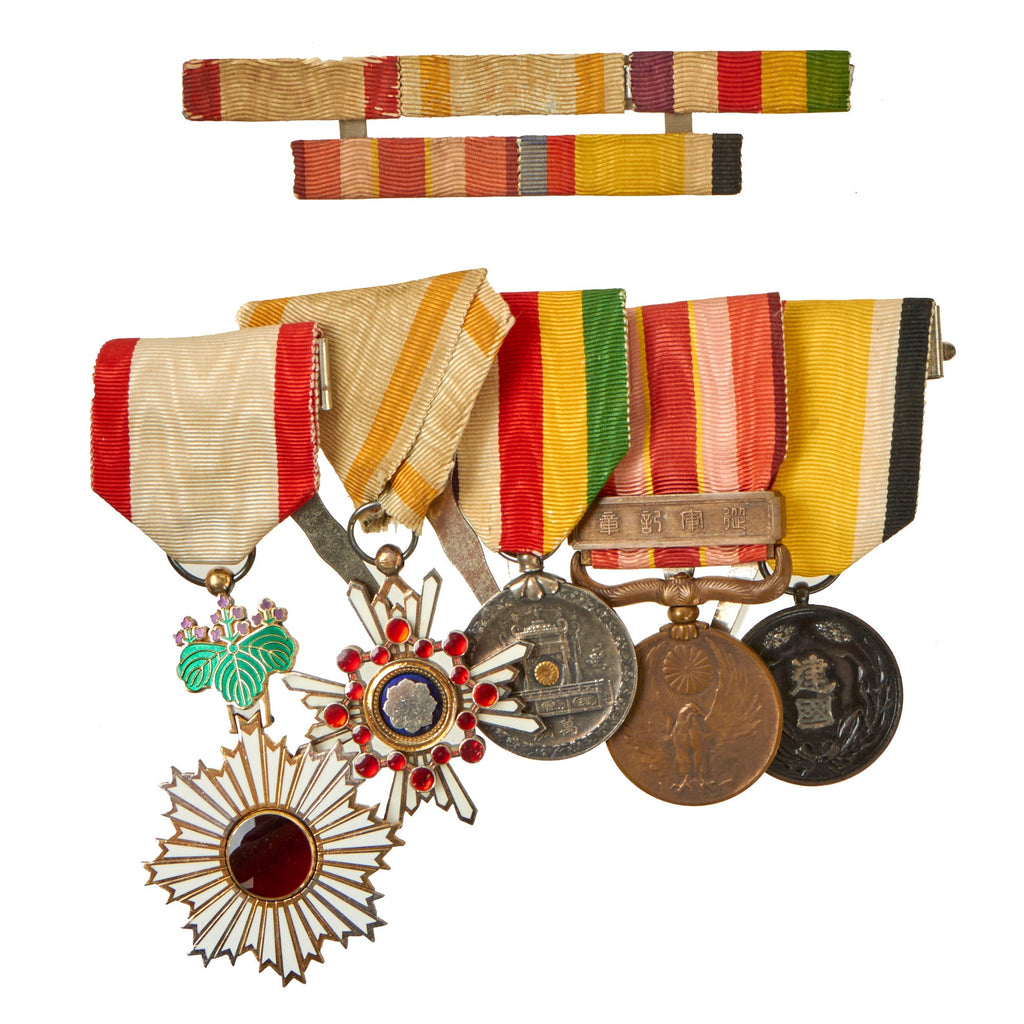Item Description
Original Items: Only One Set of 4 Available. Military Medals of Honor (従軍記章, jūgun kishō) was a military decoration for meritorious service to the Empire of Japan, formerly awarded to all military personnel who participated in battles in a war. These war medals and accompanying certificates specifically identify the conflict for which the decoration will have been awarded.
These decorations were effectively abolished during the Allied Occupation of Japan in the post-war years (1945–1951). The plausible re-institution of a modern equivalent was made unlikely by the adoption of Japan's post-war Constitution which disavows the right of the state to engage in aggressive war; but on-going political pressure for an amendment to Article 9 of the Japanese Constitution renders that prospect marginally possible.
The medal set is in overall good condition, with only minor cosmetic blemishes that are common with age and use. The ribbons, however, show noticeable signs of wear and tear. Despite this, the set remains a stunning example of Imperial Japanese Medals and is sure to be a prized possession for collectors. The intricate details and expert craftsmanship of each medal are a testament to the skill and artistry of the time period in which they were created.
The Medals/Ribbons In this Lot (From Left to Right As Viewed)
- The Order of the Rising Sun: The Order of the Rising Sun (旭日章 Kyokujitsu-shō) is a Japanese order established on 10 April 1875 by decree of the Council of State. The Order was the first national decoration awarded by the Japanese government.
The order is conferred upon those who have made distinguished achievements in international relations, promotion of Japanese culture, advancements in their field, development in welfare, or preservation of the environment. Prior to the end of World War II, it was also awarded for exemplary military service.
While it is the third highest order bestowed by the Japanese government, it is however generally the highest ordinarily conferred order. The highest Japanese order, the Order of the Chrysanthemum, is reserved for heads of state or royalty, while the second highest order, the Order of the Paulownia Flowers, is mostly reserved for politicians.
The awarding of the Order is administered by the Decoration Bureau of the Cabinet Office headed by the Japanese Prime Minister. It is awarded in the name of the Emperor and can be awarded posthumously.
- The Order of the Sacred Treasure: The Order of the Sacred Treasure (or 瑞宝章 Zuihō-shō in Japanese) is the most widely conferred Japanese order and it was established on 4 January 1888 by Emperor Meiji and originally called the Order of Meiji. It is awarded for both civil and military merit, though of a lesser degree than that required for the conferment of the Order of the Rising Sun.
It was initially awarded in eight classes, but since 2003 this has been changed to six classes (the lowest two medals were abolished that year). The Order is awarded to those who have made distinguished achievements in research fields, business industries, healthcare, social work, state/local government fields or the improvement of life for handicapped/impaired persons.
Although the order was originally only given to males, it’s been made available to women since 1919. Conventionally, a diploma is prepared to accompany the insignia of the order. In some rare instances, the personal signature of the emperor will have been added.
- The Showa Enthronement Commemorative Medal: The Showa Enthronement Commemorative Medal was created to celebrate the ascension of Emperor Hirohito (the Showa Emperor) to the throne, who did so upon the death of his father in 1926. The enthronement ceremonies were held in 1928.
The medal was freely issued to people throughout the country who participated in the celebration ceremonies.
- The 1931-34 China Incident War Medal: The China Incident Medal (Sina jihen jugun kisho) medal was created by Imperial Edit No. 496 on July 27, 1939 and awarded for service in China at any time from the 12th through the 20th years of the Shōwa period — Shōwa 12-20 (1937–1945). The decoration was abolished in 1946 by government ordinance No. 177.
Although the Japanese government still uses “China Incident” in formal documents, media in Japan often paraphrase it with other expressions like Japan-China Incident (日華事変 Nikka jihen) or (日支事変 Nisshi jihen). The word Shina is now construed by China as a derogatory term.
The Military Medal of Honor (or 従軍記章 jugun kisho in Japanese) was a military decoration for meritorious service to the Empire of Japan, formerly awarded to all military personnel who participated in battles in a war and effectively abolished during the Allied Occupation of Japan in the post-war years (1945–1951).
The plausible re-institution of a modern equivalent was made unlikely by the adoption of Japan’s post-war Constitution which disavows the right of the state to engage in aggressive war.
- Manchukuo National Foundation Medal: Japanese (Puppet State of Manchuria) Manchukuo National Foundation Medal. The Medal was instituted on 1 March 1933 to acknowledge those who had been instrumental in establishing the new ‘independent’ Great Manchu State. Backside reads: “Great Manchukuo / National Foundation Merit Medal / Ta Tung 1″.
A lovely set that comes more than ready for further research and display.
- This product is available for international shipping.
- Eligible for all payments - Visa, Mastercard, Discover, AMEX, Paypal & Sezzle


















